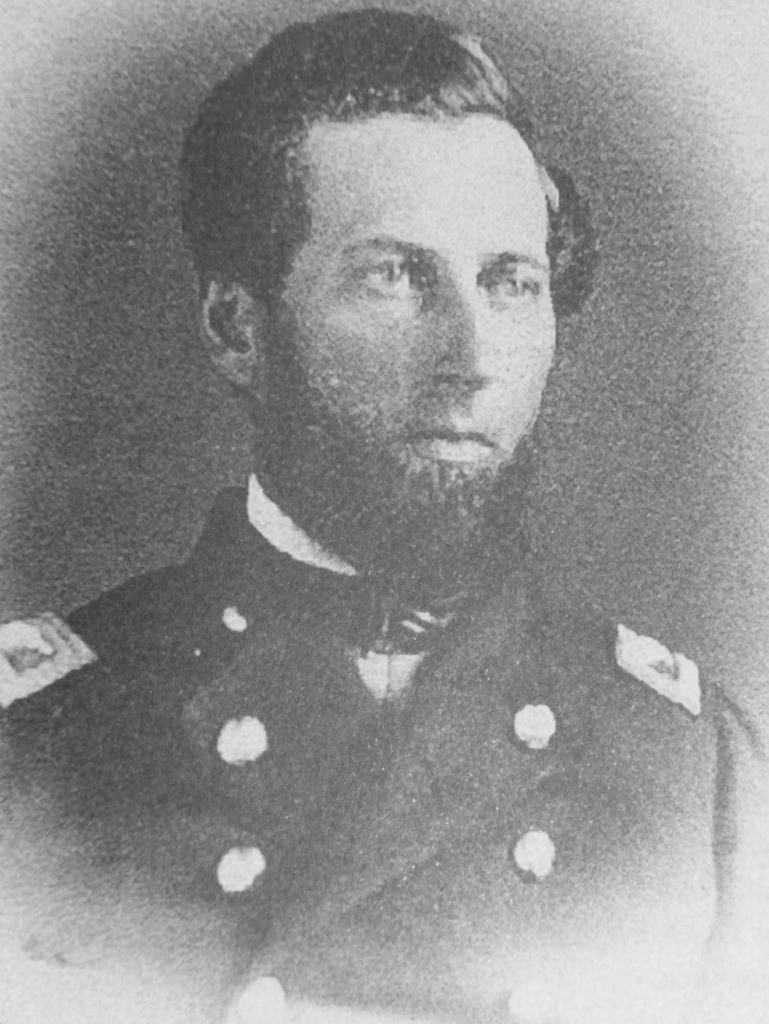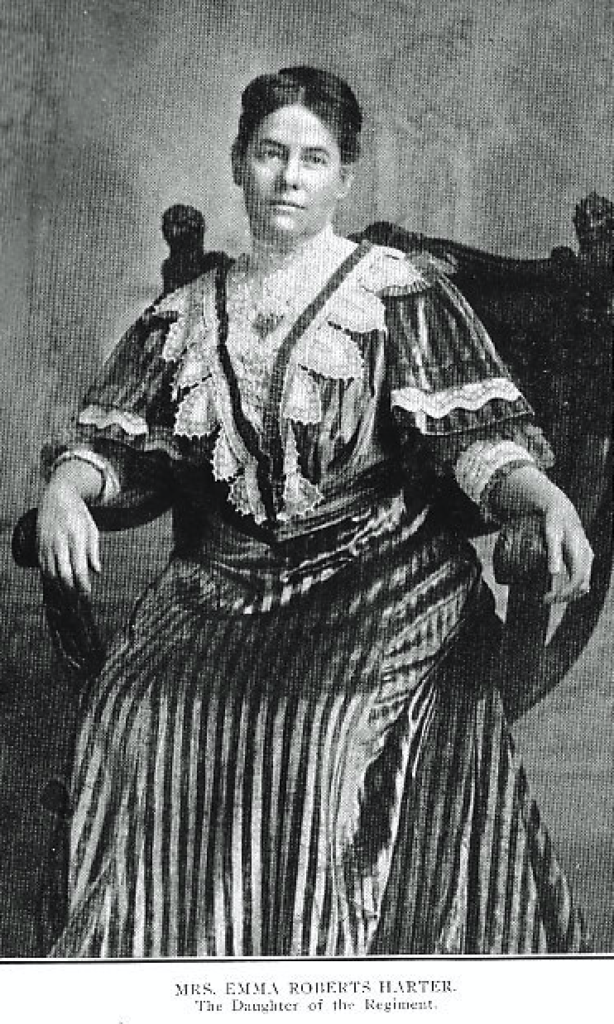“It affords me very great satisfaction to be able to inform you that…I received the sword-belt and scabbard which were taken from your father’s body upon the field at Gettysburg,” wrote Dr. John Wilson Wishart from a field hospital near Cold Harbor, Virginia. The recipient of the letter was 10-year-old Emma Roberts, a young girl orphaned by war.
The years leading up to the Civil War were hard on the Roberts family. Richard Roberts was a prominent lawyer and the district attorney of Beaver County, Pennsylvania. He married Caroline Henry on May 1, 1851, and the union produced three children—Thomas, Mary, and Emma. Emma J. Roberts was the middle child born on December 2, 1853, and the only Roberts child to live to adulthood. On February 4, 1862, Caroline passed away, leaving Robert a widower and Emma motherless.
By the summer of 1862, the situation in the Eastern Theater of the Civil War was reaching a boiling point. Confederate General Robert E. Lee’s Army of Northern Virginia escaped the clutches of the Federal army around Richmond, Virginia, and was campaigning into Northern Virginia, eventually moving into Maryland. During this “Emergency of 1862,” President Abraham Lincoln issued a call for volunteers to bolster the Federal ranks. Roberts, an ardent republican and supporter of the Union, called on Pennsylvania Governor Andrew Curtin to allow him to raise a company in defense of the country, but did not wait for the governor’s reply. Instead, on July 18th, he began traveling to churches in rural Beaver County, rallying men to the cause. He must have been a passionate and influential speaker because instead of filling one company, he filled three!
By September, Roberts found himself at Camp Curtin in Harrisburg, Pennsylvania, and elected as colonel of the 140th Pennsylvania Volunteer Infantry. Companies from Greene, Mercer, and Washington Counties joined their Beaver County comrades. Richard often corresponded with Emma. “I think about you every hour in the day and hope you think about your Pa,” read one letter. In another, he asked about her visits to the homes of her aunts and reminded her, “remember the very good lessons taught by your Ma, so that you may grow up to be as good as woman as she was.” Having lost his wife and two other children, Richard consistently inquired about Emma’s health, often offering suggestions about how to stay healthy. Most letters were signed “Your Affectionate.” or “Your Loving, Pa.”
In May of 1863, Roberts and his 140th Pennsylvania fought in their first battle at Chancellorsville, Virginia. The unit was in the thick of the action near the Chancellor House. As a memento, Richard sent Emma, “a quarter dollar which I carried her in my pocket during all the days of the Battle of Chancellorsville.”
In June of 1863, the 140th Pennsylvania was on the march in pursuit of Lee’s army during the Gettysburg Campaign. Richard Roberts was sick through much of the march into Pennsylvania. It was a grueling trek along hot, dusty roads. On July 1, Roberts sat on a tree stump outside of Uniontown, Maryland, and penned a quick note to Emma. The closing read, “We are going to march in a few minutes. Be a good girl. Good by my dear. Your affectionate, Pa.” They were the last lines that the father wrote to his daughter.
On July 2, 1863, Lee’s army attacked the Federal position at Gettysburg. The Rebels attacked at now-famous places such as Little Round Top, Devil’s Den, the Peach Orchard, and the Wheatfield. Roberts and his 140th Pennsylvania were called into action late in the afternoon. They assumed a position on Stony Hill, adjacent to and west of the Wheatfield. There the Keystone State men held the right of the 1st Division, 2nd Corps. Confederates from South Carolina and Georgia assailed their position. “Men of the 140th!” bellowed Roberts as his men went into action, “Recollect that you are now defending your own soil and are fighting to drive the invader from your homes and firesides. I shall therefore expect you to conduct yourselves as in the presence of your wives, your sisters, and your sweethearts, and not disgrace the flag you bear or the name of Pennsylvanians.” The battle raged on and around Stony Hill as Roberts stalked the battleline, reminding his men to “Fire low. Remember, you are Pennsylvanians.” As he prepared to redeploy his regiment, a bullet ripped into Roberts body. He fell dead on the field of battle, his unit driven from Stony Hill. Of the 515 men from the 140th Pennsylvania who entered the action on July 2, 241 were killed, wounded, or captured. Due to the melee of battle, Roberts’s body was not recovered for a few days, and in that time, he was stripped of his valuables, including his sword, scabbard, and sword belt.
In the meantime, letters containing condolences and well wishes from the men of the 140th Pennsylvania streamed into the Pittsburgh area to their newly “adopted” daughter Emma. She was known as the “Daughter of the Regiment.” On May 6, 1864, the sword belt and scabbard of Richard Roberts were “taken from the body of a dead Rebel vol…in the Wilderness…” by a member of the 149th Pennsylvania. It was probably of little consolation to the young girl that her father’s sword belt and scabbard were recovered, but clearly, to Dr. Wishart and the men of the 140th Pennsylvania, it helped them to cope with their grief at the loss of their commanding officer, and they hoped too, that it might help Emma in her healing process. “I look forward to meeting you in person with an interest arising from my relations with your father whom, we all sincerely mourn, and, meantime, commending you to the care of our heavenly Father, the God of all comfort who comforteth [sic] us all in our tribulations.”
Richard Roberts was buried in Beaver Cemetery and Mausoleum. His beloved daughter Emma grew up, and in 1876 married Richard Harter, second cousin of First Lady of the United States Ida Saxton McKinley. The couple moved to Canton, Ohio, and she had three children of her own, two of which lived to adulthood. Emma J. Roberts Harter died in Canton, Ohio, on October 22, 1929, at the age of 75.
To learn more about the Battle of Gettysburg and experience this battle through the eyes of soldiers who were there, join Fold3® and the American Battlefield Trust live from the battlefield on July 1-3, 2021. See artifacts from the battlefield and learn from the experts during this virtual tour of Gettysburg! Click here for more details on this 158th anniversary live stream event.







